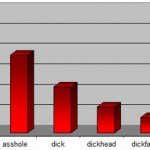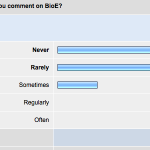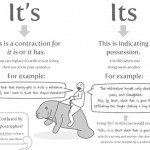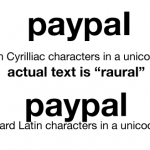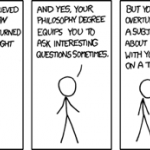Web 2.0, New Media, and Gadgets
Virtual reality trailblazer Jaron Lanier has a somewhat curmudgeonly, critical new book out called You Are Not a Gadget: A Manifesto. Here's an excerpt:
If you want to know what's really going on in a society or ideology, follow the money. If money is flowing to advertising instead of to musicians, journalists, and artists, then a society is more concerned with manipulation than with truth or beauty. If content is worthless, then people will start to become empty-headed and contentless. The combination of hive mind and advertising has resulted in a new kind of social contract. The basic idea…
When I dared my friend John to make "You've Been SCIENCED" into a pop culture tagline, using his science radio show as a platform, I didn't think he'd actually DO it. But he did:
I just wish Drew Carey had used the "Pigs In Space" intonation of "You've been SCIENCED."
This is the best blog post ever. And read the comment thread - it's totally worth it.
Via many people.
Suppose you have a question about a new medication your doctor has prescribed to you. How do you find out more about it? You probably Google it, right? But what do you do with the list of results that come up, which is likely to include a Wikipedia page, a blog entry or two, some posts on e-patient forums, the manufacturer's website, and a few online pharmacies with FREE SHIPPING? Perhaps you skim these pages, judge their usefulness and reliability, and end up at a Wikipedia page or a knowledgeable blog entry written by the likes of Scibling Abel Pharmboy. No problem.
But now suppose it's…
Did you hear about the scio10 civility meltdown? More about that in a minute. As you may have heard, it got a bit. . . uncivil. I wasn't there, so you, like me, will have to get your impression from this highly realistic renactment, created by an attendee who witnessed the confrontation between Nature's Henry Gee and our very own Zuska:
Whoa. Do I detect some tension? I'm reminded of the classic post 7 reasons the 21st century is making you miserable, according to David Wong:
Some of us remember having only three channels on TV. That's right. Three. We're talking about the '80s here. So…
A simply insane list of digital museums, libraries, and learning resources.
A short (~4 minute) sweet overview of the political power of data visualization, by Tufte disciple Alex Lundry. He says so-called "dataviz" exists (you guessed it) "at the intersection of art and science." Quite right, sir!
You'll note Lundry makes use of the classic pirates-global warming relationship, Tufte's "pie charts suck" message, and so on. It's one of several good videos from a great event I really want to get to - igniteDC. I'd also like to mention that I'll be reviewing Connie Malamed's new book, Visual Language, which appears near the end of the video, in about a week or so, so…
Thanks to everyone who participated in the unscientific survey on commenting. The results are back, and I'd like to share them with you.
As many of you have noticed, we've been talking about comments a lot here lately, both at BioE and on Sb in general. There's also a big session on online civility coming up at SciOnline '10. So the main purpose behind the survey was to get you involved in that discussion.
I've brought the issues of uncivil and uninformed comments up in several posts, sometimes rather provocatively, but we already know that the majority of blog readers don't comment often,…
Light Writing Proposal, by Derick Childress. Via Good.
Congratulations, Derick and Emily.
Attention all art/science web-collaborative types! Dave Ng has just formally announced the Phylomon Project. Here's the hook: a paper published in 2000 determined that an 8 year old could identify and characterize 120 different Pokemon characters, but when it comes to animals in their own backyard, kids have no clue.
There's nothing wrong with kids having rich fantasy worlds - far from it. But why not give them the chance to discover that real biology is also incredibly cool - not to mention complex, beautiful, and for many kids, right outside their back door? Maybe I'm showing my age, but…
BioE readers: if you have a minute, take this quick five-question survey to let me know your thoughts on blog comments. Thanks!
The survey is now closed. Thanks!
Ten Words You Need to Stop Misspelling (detail)
view the whole thing at The Oatmeal - it's great.
While blogging late at night, I've sometimes wondered whether an extensive study of blog comments would yield a set of emergent categories, which could then be organized into a sort of phylogeny representing different species of blog commenter. I'm not referring to politics, academic discipline, or favorite ideological hobby horses: I'm talking about comment writing style and what you can infer from it, independent of a comment's content. For example, you have no doubt encountered Grammar Nazis…
Miguel Rivera, a systems administrator at a U.S. Air Force base in Southwest Asia, builds robots and vehicles from the base's trashed hard drives:
"The overall concept was to make something out of just hard drive parts and pieces," says Rivera. "I wanted it to look solid and heavy so I leaned towards just using metal -- no plastic or gluing things together."
Via Wired. Thanks to John O for the heads up.
I encourage everyone to read this thoughtful post by Janet, and contribute your thoughts.
Often, questions about online civility are dismissed with the comment "get a thicker skin" - as if it simply doesn't matter whether people address each other with respect online. I think it does matter. In the offline world, the "us/them" mentality fosters prejudice and misunderstanding - just turn on FoxNews. If that mentality also dominates the online world, turning it into a bunch of bickering echo chambers, we lose one of our best opportunities for constructive dialogue with people of other…
To follow up on my previous review of KC Cole's book about the Exploratorium, here's a nifty exhibit called "How People Make Things." It's a traveling exhibit (by the Children's Museum of Pittsburgh, not the Exploratorium) that demonstrates the basics of manufacturing processes like injection molding and assembly.
It's interesting to compare the experience you may imagine having in the exhibit room above to the experience of the website, which uses a one-directional lecture mode (warning: be prepared for the Mr. Rogers cameo). It's ironically difficult to successfully translate hands-on…
"the whole point of the Exploratorium is for people to feel they have the capacity to understand things." --Frank Oppenheimer
I admit it: I'd never heard of Frank Oppenheimer until I received my review copy of K.C. Cole's Something Incredibly Wonderful Happens: Frank Oppenheimer and the world he made up. I thought for a day or two that it was a book about Robert Oppenheimer, the so-called "Father of the Atomic Bomb," and was thus completely befuddled by the book's cheery title and its cover - a fanciful cloud of iridescent bubbles.
Of course, I was off by a sibling. Frank Oppenheimer was…
According to Christina Warren at mashable.com, the switch to allowing non-Latin alphabet characters in web domains could give scammers a brand new toolkit. That's because browsers can't render many non-Latin characters, and the approximations may be doppelgangers for trusted sites. Alternatively, an address in an alphabet like Cyrillic, which shares certain letterforms with the Latin alphabet, can appear indistinguishable from pre-existing Latin-alphabet addresses:
Uh-oh.
It's only fair that users of different alphabets get to register their own addresses, but clearly there needs to be some…
I went to see Randall Munroe, creator of xkcd, a few weeks ago at MIT. Unfortunately the line to get him to sign books was about fifty frenzied geeks long, so I didn't stay for that. But I did enjoy his dialogue with the audience, which mainly consisted of answering questions ranging from obsessive fanboy minutia (why is xkcd published on Monday, Wednesday and Friday?) to vast and metaphysical (what is the true difference between geeks, nerds and dorks?) The latter question led to Munroe doodling and tinkering with a ridiculously convoluted Venn diagram, the details of which I can't remember…
This explanatory video from Wired/the Exploratorium shows how "Dr. Megavolt" (Austin Richards) created a birdcage-topped stainless steel bodysuit, so he can play with the giant Tesla coil he built. This guy knows how to have fun, man.
